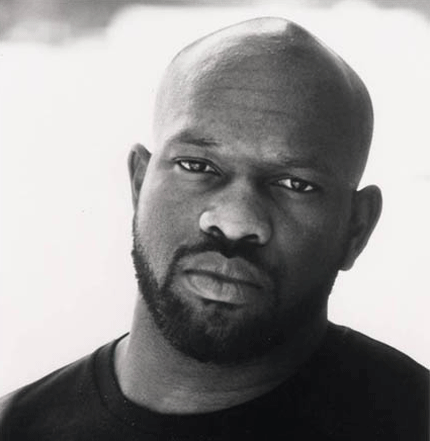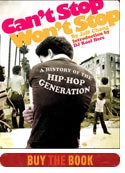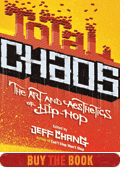Village Voice
April 2002

In 2002, then 33-year-old Bakari Kitwana ushered in a new era of hip-hop intellectual work with his book, The Hip-Hop Generation. Since that time, hip-hop studies has quickly expanded in the academy. Here’s a snapshot from that new dawn.
Without dogma or jargon, Bakari Kitwana’s important new book, The Hip Hop Generation: Young Blacks and the Crisis in African American Culture, cuts right to the chase. “What will be our generation’s contribution to the centuries-long African American struggle for liberation, and how do we redefine this struggle for our time?” he asks.
For us freedom-thinking young’n’s, Kitwana’s emergence as a young Black public intellectual is itself as important as the questions that he poses. Up until now, folks who have been grandfathered into the hip-hop generation have interpreted and explained, per DMX, “who we be” to the world. Last summer’s Hip Hop Summit, sponsored by 44-year old music mogul Russell Simmons proffered the brains of author/pundit Michael Eric Dyson, Columbia professor Manning Marable, and prophet-turned-rapper Cornel West to augment hip-hop’s industrial brawn. The three promised to set up a think-tank, which was kinda like the Impressions saying they’d like to study what makes the Neptunes so cool.
While rappers like KRS-1 and Chuck D have been celebrated (and attacked) as the hip-hop generation’s vanguard, the difference between these edutainers and hip-hop generation intellectuals is the difference between Nina Simone and Angela Davis. Since the mid-90s, the intellectual output of the much-maligned, oft-misunderstood hip-hop generation itself has expanded exponentially. But the hip-hop intellectuals find themselves laboring mostly in obscurity, waiting, often graciously, sometimes angrily, for the baby boomers to clear the lane.
For years, intergenerational conflict has underscored the relationship between the civil rights generation and the hip-hop generation. Baby boomers of color wholeheartedly supported many of the repressive anti-gang and anti-crime laws that led to the widespread racial profiling and jailing of youths of color. Although C.Delores Tucker denounced rap misogyny, many hip-hop feminists felt her 1995 crusade against gangsta rap was a generational attack. “(W)e often see our parents themselves (and their peers) as the enemy within,” writes Kitwana in his book.
His personal story reflects this tense relationship like Radio Raheim’s “Love”/”Hate” four-finger-rings. He was a 19 year-old sophomore mechanical engineering major at the University of Rochester–the first from a family of African American migrant workers to attend college–when he caught the tail winds of the revolution, during a reading by Chicago-based black power poet and author Haki Madhubuti. After picking up masters degrees in English and Education, Kitwana followed Madhubuti back to Chicago to take an editing job at the Third World Press, a publishing house founded by activists specializing in Afrocentric books. Black Power exemplars such as Sonia Sanchez, Gwendolyn Brooks, and Kalamu ya Salaam nurtured Kitwana there. At one point, Kitwana was tapped as Madhubuti’s successor.
“But”, Kitwana says, “I felt that the message, as important and as critical as it was, had to be redefined for our generation.” He moved to New York to join the influential hip-hop magazine, The Source. The contrast couldn’t have been greater–from low rents to high rollers, agenda-minded to hype-oriented, black-and-white to living color, from the past into the future. He might have appeared to fit a Gen-X-with-a-hip-hop-twist stereotype: seduced by power and money, soft of moral and ideological fiber, the career-minded hip-hopper squanders the opportunities afforded him by the civil rights activist’s frontline heroism.
Kitwana argues that the truth is much more complicated. The hip-hop generation–a cohort he limits to African Americans born between 1965 and 1977, but which could well apply to youths of all colors who came of age with and after the Afrika Bambaataa and the Soulsonic Force’s “Planet Rock”–has been shaped by globalization and unemployment, incarceration and racial profiling, gender wars and nihilism. Gone forever are the days when “the struggle” was simply about fighting segregation. The hip-hop generation is beset by economic dislocation, environmental racism, AIDS, inadequate schooling, inner-city disinvestment, culture wars, and ya don’t stop.
At the same time, Kitwana notes, the hip-hop generation is the first to grow up without the limitations of legal segregation. He writes, “It is impossible not to see young Blacks in the twenty-first century’s public square-on television, film and the Internet. Our images now extend far beyond crime reports.” This is a conundrum: images of Blacks proliferate in global media at a time when they remain politically marginalized. Not many civil rights/black power intellectuals have fully grasped the implications of this turn.
Hip-hop gen thinkers, largely inspired by early 60s-born “elders”–what Kitwana terms the “bridge” generation–like Nelson George, Tricia Rose, Harry Allen, Robin D.G. Kelley, and Greg Tate, have been advancing their own thoughtful responses to this new world. Mark Anthony Neal, Ogbonna Ogbar, and S. Craig Watkins examine the image of the black male in music and film. Raquel Rivera, Cristina VerAn, and Oliver Wang use hip-hop to understand the effects of immigration. Everything loops back into the African American experience, but there’s a whole lot going on in that cultural flow.
Hip-hop’s cross-fading mixology is the perfect analogy for this polycultural generation, as Farai Chideya’s book, The Color of Our Future (1999) makes clear. This year’s biggest conference, the University of Wisconsin-Madison’s third annual “Hip-Hop As A Movement” was launched by a white student Ben Runkle and a biracial student David Jamil Muhammad. “I’m (half) Boricua in the Nation of Islam and then my boy is this punk rock kid,” laughs Muhammad. “I was like, yo, we’re the hip-hop generation!”
Hip-hop intellectuals tend to share a combustible mix of beliefs. They sneer at the very idea of “intellectual.” They resent being called “apolitical” but use “political” as a curse, don’t need “radical” to be “chic” but tend to abuse the word “revolutionary”. They have internalized the most heated debates of thirty years ago and may agree with both sides. They prefer hard negotiation to taking a hard line, dig independence but don’t fear dancing with the devil. They are both more equal and more separate. In other words, unlike baby boomers, they embrace their contradictions, indeed, throw them into the mix.
All hip-hop intellectuals still labor under the long shadow of baby boomers. Take Joan Morgan’s classic, When Chickenheads Come Home To Roost. Morgan addresses gender issues in the best hip-hop fashion–rocking ample wit, candor, style, and emblematically, ambivalence. As she reaches for the right words to describe her generational break with the past, she falls Icarus-short, calling us the “post-Civil Rights, post-feminist, post-soul children of hip-hop.” That long, ugly appellation reveals our insecurity in defining ourselves more concretely than simply “post”-our parents.
But although many a hip-hopper’s point-of-view was forged in the heat of argument with an elder, Kitwana insists he bears no animus. *The Hip-Hop Generation* takes us beyond our counter-punch reflex. The book synthesizes positions into a kind of intergenerational Third Way.
To Kitwana, as with “bridger” Russell Simmons (my former boss at the late 360hiphop.com) and his Hip-Hop Summit Action Network, the next stage requires moving the global reach and the national infrastructure of hip-hop toward political power. *The Hip-Hop Generation* is Kitwana’s manifesto. No self-esteem-driven mazes or passive-voice philosophizing here. Kitwana issues a generational call to bridge culture and politics to pursue an issue agenda for the hip-hop generation. He argues for renewed focus on education, employment, reparations, business development, health care, and incarceration.
Equal parts generational critique, pro-black youth polemic, op-ed analysis, and hip-hop Molotov, Kitwana’s book has already garnered comparisons to Harold Cruse’s brilliant 1967 rant against black leaders, The Crisis of The Negro Intellectual. It may be closer in spirit to another classic of that year, Kwame Toure and Charles Hamilton’s Black Power. Kitwana hasn’t yet achieved Cruse’s depth or Toure and Hamilton’s focus, but The Hip-Hop Generation passionately makes its point: the black community can only move forward if it stops living in the past.
Kitwana blames the civil-rights-gen leadership, in part, for the failure to address the hip-hop generation’s poor education, high unemployment, and unprecedented incarceration rates. The flagging power of civil rights organizations, like the NAACP and the Urban League, is directly linked to their exclusion of a more youthful voice. “If these organizations take our issues and our agenda and make them the centerpiece of their own agenda, they’re going to breathe new life into their own organizations. Those organizations are going to inevitably change, and become more relevant,” Kitwana said in a recent interview.
But Kitwana also decries images of nihilism in rap videos and hip-hop movies. He believes no generation has ever seen an uglier war between the sexes. He rips the hip-hop generation for being enamored with celebrity worship and materialist fantasy. In fact, this year’s UCLA nationwide freshman survey–the most complete accounting of student attitudes since the 1960s–found that today’s student is three times more likely to have participated in some kind of a political demonstration than students at the peak of the civil rights movement. Still, the point is taken: we’ve got work to do.
Kitwana’s pragmatism argues against ideological rigidity, and dismisses both civil rights and hip-hop era orthodoxy. “We don’t mythologize the social gains of the 1950s, 1960s, and 1970s because having experienced the benefits of these gains firsthand we know they weren’t panaceas,” he writes. But if many hip-hoppers believe that debates over the usage of “bitch” or “baby mama” are just played-out semantics games with sensitive old folks, Kitwana systematically attaches facts, citing evidence that 2 out of 3 Black marriages now end in divorce.
Hip-hop, Kitwana argues, can be the solution. The global hip-hop industry offers a powerful infrastructure that can be turned towards transformative, liberating purposes. A generational agenda can be pursued in a “unified front” merging culture and politics.
Simmons’ HHSAN has already been working this angle. But Kitwana has sharp criticism for the HHSAN, at one point calling it an organization that runs “the same game with another name” for the benefit of music execs and entrenched civil rights leaders. Kitwana argues the HHSAN has neither reached out to hip-hop activists nor fostered hip-hop gen leadership. Mercifully, he stops short of inviting the HHSAN to holla at the hip-hop activists he highlights.
Yet his critique fails to clarify how he proposes to create this “unified front”. Where might we find common ground between music execs and anti-globalization activists?
Hip-hop culture has impressively energized global and local motion among disaffected youths. From Poland to Cuba to South Korea, the voice of young rage is hip-hop. In communities like Selma, Alabama and San Francisco, California, hip-hop activists have begun building substantial power bases. And Los Angeles City Council President Alex Padilla, Detroit Mayor Kwame Kilpatrick, and the Newark City Council candidate Ras Baraka (the son of Amiri Baraka) point to the coming wave in electoral politics.
But can hip-hop culture, now a precious commodity, really do the work? For Kitwana’s Third World Press mentors, politics–specifically decades of African decolonization and American civil rights activism–begat culture. Kitwana and the hip-hop intellectuals are faced with the opposite dilemma. In this generation, the culture must foster a politics. “The real question is this,” he writes, “why should hip-hop generationers continue to participate in and support a multibillion dollar industry if it fails to in any way address the critical problems facing our generation?” Well, we built it. Is it hip-hop’s–and our generation’s–destiny to enable revolution or accelerate entropy? As Gangstarr would say, the question remains.
Can't Stop Won't Stop Extras
- A Can’t Stop Won’t Stop Q+A By Oliver Wang
An exclusive interview about the book from 2004 - A Tribute To Richie Perez
The story of one of the Bronx greats–a Young Lord and a mentor to many. - Interviews With The Author
Four years of print, radio, and video interviews with Jeff Chang. You’ll laugh, you’ll cry, you’ll order Chinese. - Making A Name :: Book Excerpt
It has become myth, a creation myth, this West Bronx party at the end of the summer in 1973… - Writing The Book, Part 1
From 2003, the first blog post on writing “Can’t Stop Won’t Stop”. Can it be that it was all so simple then? - Writing The Book, Part 3 or 2.5
Another blog post on writing “Can’t Stop Won’t Stop” from the eve of release. Bonus angst: that vexing “Asian American question”.
The Reader Archive
- Welcome To The Reader
We’re working out the kinks in this as we both add more content and tweak the landing page. Please stay tuned.
Most Popular Topics
- 2008 Elections
Links to Jeff’s coverage of the 2008 elections for Vibe - Hip-Hop Activism
Links to some of Jeff’s articles on hip-hop activism - Music Writing
Links to some of Jeff’s stuff on music writing. Note: We’re currently trying to properly organize this section and upload lots more.



We work with the Creative Commons license and exercise a "Some Rights Reserved" policy. Feel free to link, distribute, and share written material from cantstopwontstop.com for non-commercial uses only.
Requests for commercial uses of any content here are welcome.

